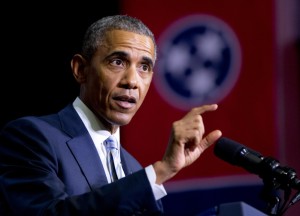Last week in the State of the Union Address, President Barack Obama outlined America’s College Promise, a plan to “lower the cost of community college — to zero.”
According to The Chronicle of Higher Education, the proposal aims to waive tuition for community college students who maintain a minimum 2.5 GPA and “make steady progress toward completing their program.” The plan applies to both half-time and full-time students and includes certificate, associate, and bachelor’s degrees. The plan would cost the federal government an estimated $60-billion over ten years, which would cover 75% of projected costs, while participating states would be asked to fund the other 25%.
 Dr. Linda Mills Woolsey, Dean of the College, who said she has “mixed feelings” about the plan, described it as a “well-intentioned” attempt to “meet a projected education gap” and to “make sure that there’s access to education for people from all economic backgrounds.” Woolsey said doing this solely through the community college system, however, encourages the mass-production of education,“we’re imagining a kind of Henry Ford type way to get students through their first couple years of education.”
Dr. Linda Mills Woolsey, Dean of the College, who said she has “mixed feelings” about the plan, described it as a “well-intentioned” attempt to “meet a projected education gap” and to “make sure that there’s access to education for people from all economic backgrounds.” Woolsey said doing this solely through the community college system, however, encourages the mass-production of education,“we’re imagining a kind of Henry Ford type way to get students through their first couple years of education.”
Eric Currie, Vice President for Enrollment Management, said while initially the plan might “create a challenging moment” for Houghton, the already existing “great transfer processes” Houghton has with community colleges will be an important asset. Currie said Houghton is likely to continue to prioritize the continued development of online programs and of the Buffalo campus of Houghton, both of which more closely meet the needs of the demographic of students primarily targeted by America’s College Promise.
President Shirley Mullen said her primary concern is the current prominence of cost in the dialogue about higher education would make it “easy for the idea of a free two-year college to just be too tempting for students for whom that really isn’t the best option and not the only option,” and usually the rhetoric about cost “underestimates the impact of [four year] education on even one’s financial resources over the long haul.” She described a sadness in the potential loss, not just for Houghton, but for all students pursuing higher education if the proposal draws students away from four-year learning communities that in general provide “a more coherent education overall.” However, Mullen also said, “we would like to have more transfer students” as they often bring a greater appreciation for Houghton and a more focused drive. Currently, transfer students make up 18% of incoming students and 15% of the student body.
Currie said while he supports anything that will bring education to more people, he would have liked to see the government offer to pay two years of tuition for eligible students at any college that was able to meet a given price cap. “I would say challenge us all to rise to the occasion. Not just community colleges,” said Currie. “Challenge whoever is willing to go and make it happen…I think that that edifies some of the best things about our society which is innovation, entrepreneurship…and the kind of take charge personality, and yet still meeting people’s needs.”
The needs of the people are not just financial. Woolsey said she embraces the social good of widely-available free education, but is not sure “it will do what we want it to do if in the process we lose the richness and variety of higher education.” Woolsey said, “These small private colleges and even some of the midsized, private Christian colleges offer an education that’s more varied, sometimes more creative, and certainly more focused on the individual.”
Though at this point it seems highly unlikely that the proposal will make it through congress any time soon, Currie said, “Whether it’s President Obama or the next President or the President after that, I think that something like this is going to come through…it’s on the radar in the federal government and in the state governments that they feel that they really want to have an impact on this issue, and I think they feel it’s important.”
